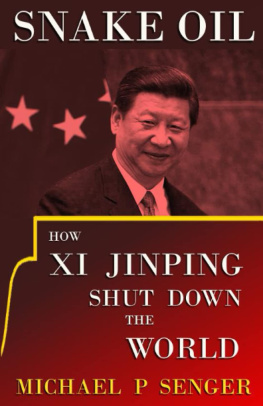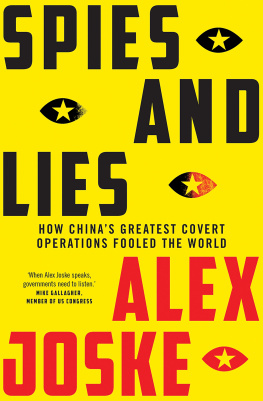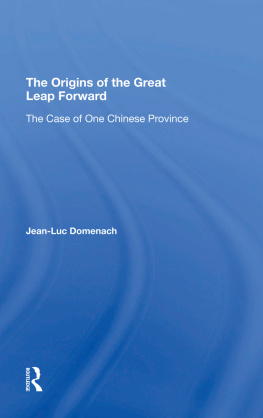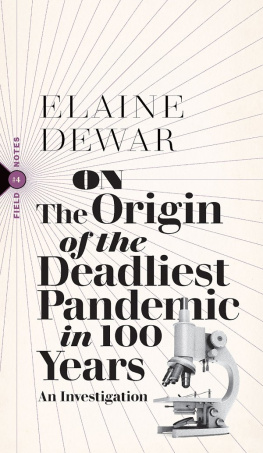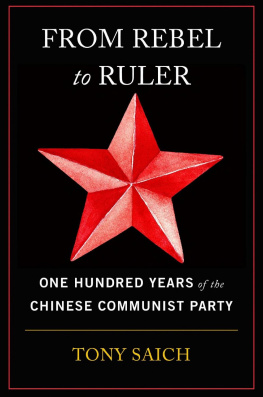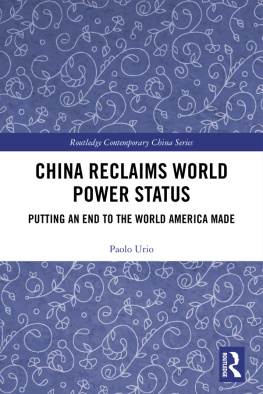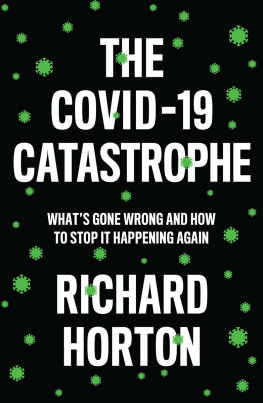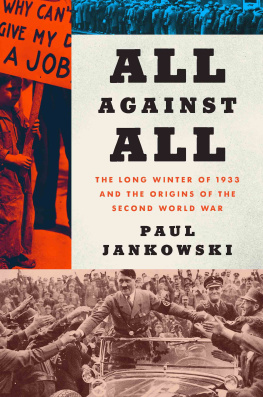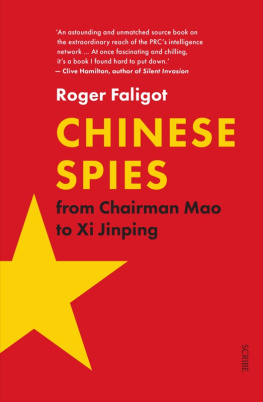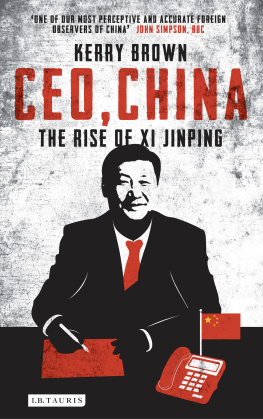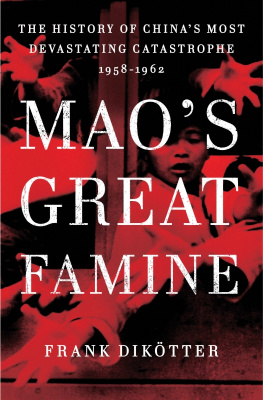All rights reserved. This book or any portion thereof may not be reproduced or used in any manner without the express written permission of the author except for the use of brief quotations in a book review.
PROLOGUE
When Chairman Mao passed away in 1976, China underwent a period of rapid reform under the new leadership of paramount leader Deng Xiaoping. Having seen little growth for half a century, China soon became one of the worlds most dynamic economies. Maos policies had kept China stagnant, but with Dengs reforms, China achieved practically unheard-of economic growth of nearly 10% per year from 1980 to 1989.
It was the 1980s, and business was Chinas business. Chinas entrepreneurs, shut out of the economy under Mao, got rich as they led the countrys transformation into a manufacturing powerhouse. Western investors got rich, seeing record profits as they flocked in to make use of Chinas previously destitute labor force. Chinese Communist Party bosses got rich facilitating lucrative contracts and business deals. Even workers began to feel rich as wages across China more than doubled. Everyone was getting rich. You just had to be there.
Amid all this progress, Chinas brightest students were exposed to liberal ideas for the first time. Though the economy grew quickly, corruption was rampant, and the best opportunities were reserved for Party elites. Hardly any Chinese had a meaningful say in government.
A democracy movement began to develop with the support of reformist General Secretary Hu Yaobang. Hu was well-known for his liberalism and his frank, honest opinions. After visiting Tibet in 1980, Hu explicitly apologized for Chinas misrule during Maos reign. Hu encouraged students and intellectuals to raise controversial subjects, including democracy, human rights, and legal limits on power, and began targeting corruption among high-ranking CCP officials. Everything Hu did irked the CCPs hardliners.
In 1986, students and intellectual leaders launched pro-democracy protests in dozens of cities. Deng Xiaoping disliked the protests and wanted their leaders dismissed from the Party, but Hu refused. For this, Deng forced Hus resignation.
Hu was replaced as General Secretary by his equally reform-minded colleague Zhao Ziyang. The year Zhao served as General Secretary is still widely viewed as the most open in the history of modern China. The CCP had officially banned pro-democracy demonstrations, but Hu was now a symbola man who wouldnt sacrifice his convictionsand the protests continued. When Hu suddenly died in April 1989, students flocked to Beijings Tiananmen Square, sparking a protest movement of unprecedented scale.
Deng ordered the protesters to stop, but for the first time in over 40 years, the people refused. The next day, a line of students four miles long marched on Tiananmen Square. Soviet leader Mikhail Gorbachev arrived to greet them. Deng was humiliated.
All of China seemed to support the students, and over the course of May 1989, millions joined in the Tiananmen Square protests. Factory workers, teachers, doctors, even soldiers and staff of the Partys propaganda outlets joined in. They had the tacit support of General Secretary Zhao, who pushed for dialogue, believing the Party should appeal to the protesters feelings of optimism and patriotism. The end of authoritarianism in China now felt inevitable. Many CCP leaders began to think nothing could stop the blossoming of democracy in Tiananmen Squarenot with the whole world watching, the cameras rolling, capturing the hope and enthusiasm of millions of Chinese for viewers around the world.
But in late May, Deng convened the CCPs highest governing body, who sharply criticized Zhaos strategy. They urged Zhao to declare martial law, but Zhao refused. In his last recorded appearance, Zhao pleaded with the protesters to end their hunger strike and promised that dialogue would remain open. Zhao was ousted as General Secretary and was never heard from again.
Deng convened a meeting of Party elders and martial law was declared the next day. Deng met with military leaders and finalized orders for units to converge at 1:00 AM on June 4, 1989, using any means necessary to clear the square.
That night, hundreds of tanks and tens of thousands of soldiers descended on Tiananmen Square. By morning, the protesters were surrounded. They were in disbelief. Former soldiers, believing the Peoples Liberation Army served the people, insisted the troops wouldnt fire. Initially, protesters thought the troops were using rubber bullets. But as screams filled the air, the reality set in.
Soldiers charged at the protesters using assault rifles, bayonets, and expanding bullets. The PLA erected machine guns directly in front of Heroes Monument, and the air erupted with deafening bursts as the gunners fired indiscriminately on the defenseless crowd. Tanks ripped through the throngs of fleeing protesters, crushing many more.
In the span of a day, the PLA had killed thousands of innocent Chinese citizens, and thousands more were gravely woundedmostly ordinary residents of Beijing. The protest leaders, Chinas best and brightest students among them, were imprisoned and tortured. Deng Xiaoping congratulated the PLA on a job well done.
Above all, the Tiananmen Square Massacre had been the result of a misunderstanding of who Deng Xiaoping really was and what his reforms really meant. A longtime member of Maos inner circle, Deng had never been as moderate as his admirers liked to pretend. Following Maos re-engagement with the west after meeting with Henry Kissinger and Richard Nixon, Deng had supported market reforms because they made China rich, but he had no taste for western democracy, human rights, or liberalism. Western media fawned over Deng the reformer, but that was largely because hed made them so much money. Even economic growth under Dengs regime was exaggerated; it was largely catch-up to the rest of the world following Maos long, tyrannical rule.
As China had reopened economically, the world believed Dengs regime would be open to democratic reforms, even if that meant relinquishing its hold on power. Deng believed no such thing. His vision had never included political tolerance. Much of what the world thought they knew about Deng Xiaoping was simply a lie.
Under Dengs rule, punishments for minorities and those who stepped out of line were arbitrary and cruel. Chinese citizens were frequently executed for petty crimes, either real or imagined. After the Tiananmen Square Massacre, many of Hu and Zhaos liberal reforms were rolled back.
The Chinese government drew widespread condemnation for Tiananmen Square, and China was briefly isolated. But President George H.W. Bush, former head of the U.S.-China Liaison Office, privately resolved to resume commercial relations, and sanctions were quickly lifted. By the end of the Bush presidency, it was business as usual, and the rest of the world soon followed.
For anyone who cared to see, Tiananmen Square is where the principles of the postwar international order died. Beginning at Tiananmen Square, the CCP sought to prove that even the newest information technology could be subverted to tyrannical ends, and that ideas really could be killed with the right amount of violence. They gambled that the free worlds commitment to human rights could be worn down with enough patience.
Over the coming decades, information did not liberalize the authoritarian world. Instead, the world became more like China. And 30 years later, the free world would be forced to confront the true cost of the devils bargain it had struck with the Chinese Communist Party in the aftermath of Tiananmen Square.

